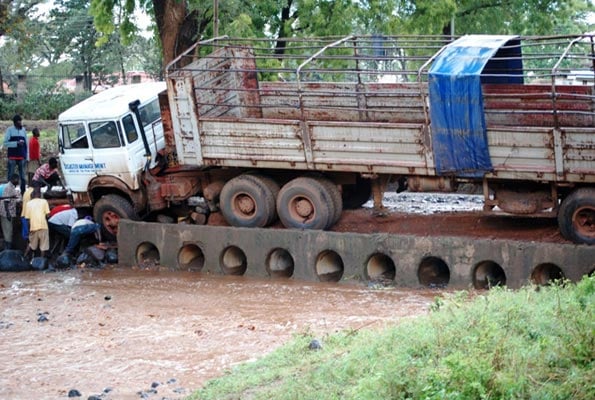Prime
We are rolling out cheaper road building methods - Road Fund boss

Dr Andrew Naimanye, the executive director of the Uganda Road Fund. Photo/ Isaac Kasamani
What you need to know:
- Dr Andrew Naimanye is celebrating three years as executive director (ED) of the Uganda Road Fund (URF). Isaac Mufumba caught up with him to discuss the challenges that the Fund is facing in making Uganda’s roads more motorable.
You celebrate three years in office as ED. What is your opinion on the general state of the roads around the country?
I was in an acting capacity for two years until July 2021 when I was confirmed and appointed by the minister of Finance and Economic Development. In this role, I celebrate three years of advocating for sustainable road maintenance financing.
What is your opinion on the general state of the roads around the country?
Roads are generally in a fair condition. We have deliberately encouraged all designated agencies – that is UNRA [Uganda National Roads Authority], KCCA [Kampala Capital City Authority], 135 districts, 10 cities, 31 municipalities, and 1,185 sub-counties – to prioritise routine maintenance to make roads motorable throughout the year.
There have been complaints by people in and outside the government about the cost of doing roads in Uganda
Road infrastructure has unique characteristics that we may not easily conclude, that one is more expensive than the other by simply looking at basic geometric properties like road length/width which is usually the case. In Uganda specifically, roads might cost more than what we see in other countries due to the high associated costs of acquiring the right of way, challenging topography, high cost of imported inputs, and the high likelihood of constructing through water basins like rivers, streams, and swamps, among other factors.
What can be done to bring the cost down?
There are several ways the cost of construction can be reduced in Uganda. The most direct way is the reduction in the use of imported inputs such as Bitumen, which will soon be available locally through the exploitation of our oil resources. The other ways could be monetary policy revision to reduce the cost of capital for construction, and reforms in land laws to prioritise public infrastructure.
Community involvement in road construction can also help reduce the costs of a road. We have community members who donated their land to Wakiso District to aid the expansion of a section of Jenina-Kyebando-Naluvule Road.
It is important to note that the Road Fund is not involved in direct procurement. We finance designated agencies that implement these road maintenance programmes. As Road Fund, we’re financing research into alternative road construction technology and also rolling out cheaper road construction techniques like low-cost sealing. This has drastically brought down the cost.
There have been complaints about the longevity of our roads. Why do the roads seem to have a short lifespan? What is it that we are not doing right?
Currently, most of the roads are built to last 15 years. However, only responsible road use and consistent maintenance can enable these roads to live up to the full design lives. Think about overloaded trucks on roads without weighbridges. You have seen people burn tyres over roads and so has climate change destroyed these roads before they serve their lifespan.
What should be done to change that story?
We must sensitise communities on responsible road use and ensure timely and sustainable road maintenance funding.
According to your own survey released in May this year, 53 percent of Ugandans are dissatisfied with the road network because of potholes, dust, narrow roads, poor drainage, and inadequate road maintenance. What can be done to change what Ugandans think?
Road user satisfaction revolves around funding. An increase in URF’s annual road maintenance budget will make a difference. We need Shs1.2 trillion but we are receiving about 40 percent. The increased budget will reduce the maintenance backlog. This will see a balance between road maintenance and road development financing.
Local governments have continuously decried the poor state of roads and attributed it to low funding. Fort Portal City, for instance, projected to receive Shs924.7m this financial year under the Road Fund, but only secured Shs231m by the end of the first quarter. What causes such discrepancies?
We currently get 100 percent of our funding through Parliament appropriations which is prone to budget cuts. We are unable to receive all the road user charges as outlined in the Road Fund Act, 2008, and these amount to Shs2.8 trillion currently.
The budget was severely suppressed with cumulative quarterly releases performing way below the 50 percent mark at half FY. Therefore, the actualisation of the 2G fund status will guarantee more funds available for road maintenance. URF is pursuing 2G Fund status as a long-term solution to inadequate funding for road maintenance.
With the rains currently pounding most parts of the country, many of these roads have become impassable, causing untold loss of time and money. Why can’t we prepare ahead of time?
As a fund, we plan for everything and that is why we have a small emergency fund that deals with such emergency road repairs when the need arises especially those destructed by natural disasters. However, we need to also understand that climate change is real.
Several stories have been reported on the mismanagement of road funds by local governments. Do you follow up to ensure value for money?
Internally, we undertake technical and financial reviews of our annual road maintenance programmes using our in-house teams and also undertake monitoring and evaluation on a quarterly basis through sampling. Designated agencies are ranked according to financial and physical performance.
Through the District Roads Committees, members perform an oversight role of inspecting ongoing road maintenance programmes to ensure value for money. Many have been prosecuted in courts of law over misuse of funds.
We have had issues with delayed payments of contractors that attract penalties. The 2019/2020 Auditor General’s report, for instance, says we lost Shs23.6b to these penalties. Why can’t everyone do their work and we avoid such penalties?
We play our role and always caution accounting officers of designated agencies to desist from committing to work outside the approved work plans and release funds to avoid such cases. As earlier shared, we don’t contract service providers, we fund implementing road agencies.
The spotlight has recently been on accidents on our roads. Accidents have been blamed on driver behaviour, but should we ignore the fact that sometimes these drivers drive recklessly because they are responding to the conditions of the roads?
Changing road user behaviour is critical in minimising road accidents in Uganda. Road safety is complex and is a shared responsibility. We must make personal individual decisions based on the current condition of the road and the highway code. Our 2021 road user satisfaction survey highlighted a lot of gaps in driver and rider training. If addressed, roads will be safer.
Let’s talk about the state of roads in Kampala, the heartbeat of the economy. Of the 2,100km road network, only 600km is paved and 60 percent has outlived its lifespan. Are we paying much attention to the needs of the capital?
We are paying way more attention to Kampala roads to decongest the central business district, and address flooding. For example, we often fund special road projects such as the Centenary Park road.
This publication recently reported that more than 500 potholes have eaten away at four critical city roads, a few months after they were patched up. What solution do you have for Kampala potholes?
Yes, Kampala roads were mostly done in the 1960s and it is time to find a solution, which is to increase KCCA’s road maintenance funding and reconstruction of key roads.




